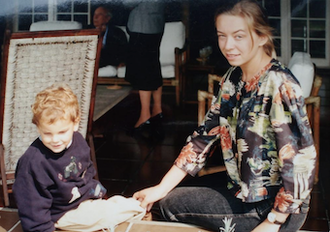St Carlo Acutis: Brought to Catholicism by his Polish nanny

Little Carlo with his nanny Beata Sperczyńska
Source: British Poles UK
When Beata Sperczyńska left her home in southern Poland to find work in Italy, she could hardly have imagined the role she would play in shaping the spiritual life of a boy who would one day be declared a saint. Hired as a nanny by the Acutis family, she became the first person to introduce young Carlo to the world of prayer and devotion. It was Beata who taught him the simple yet profound words of his very first prayer: the traditional Polish "Aniele Boży, Stróżu mój" ("Angel of God, my guardian dear"). According to journalist Krzysztof Tadej, speaking to Vatican News, the boy would repeat the prayer several times a day, always in Polish, reciting it with fascination and deep sincerity.
On Sunday, 7 September, Carlo Acutis will be canonised in Rome, becoming the first saint of the millennial generation. Behind this remarkable story lies the quiet influence of a Polish caregiver whose presence in the family home proved to be far more than professional. Sperczyńska, who today lives in New York and works as a director in an international company, played a pivotal role in nurturing the spiritual curiosity that blossomed into Carlo's renowned devotion.
Carlo's mother has openly admitted that, until her son's First Communion, she had only stepped inside a church on a handful of occasions. It was the nanny's example and gentle teaching that awakened in the child a love of prayer. Sperczyńska herself recalled that Carlo was captivated by the words of the guardian angel prayer, often asking her to explain their meaning and reciting them with striking fervour. Alongside prayers, she also introduced him to a handful of Polish phrases. When Beata's parents telephoned from Poland, it was often Carlo who answered the receiver, greeting them cheerfully with "dzień dobry" or "witam was".
Equally significant was the first religious image to enter his life: a small picture of the Black Madonna of Częstochowa. Beata had carried it with her from Poland and offered it to the boy on her very first day at work. That simple gift became Carlo's first image of Holy Mary, a symbol that would accompany him as his faith deepened.
Her influence extended beyond nursery duties. Beata was the first to open Carlo's imagination to deeper questions about God and the Church. He soon carried these conversations into the home, peppering his mother with what she later described as "persistent, insistent questions" about faith, questions that ultimately led to her own conversion. Inspired by her son's example, his daily prayers and his commitment to attending Mass, she enrolled in a theology course in Milan and returned to active religious practice.
"Without my son," she admitted, "I would never have found my way back to God."
As Cardinal Konrad Krajewski has said, "Live in such a way that people ask you about God."
It was precisely this lesson that Carlo absorbed from his Polish nanny, whose quiet influence has now taken on historical significance in the life of the Church.
(This article, republished with permission, first appeared in British Poles UK)
LINKS
British Poles UK: www.britishpoles.uk/


















